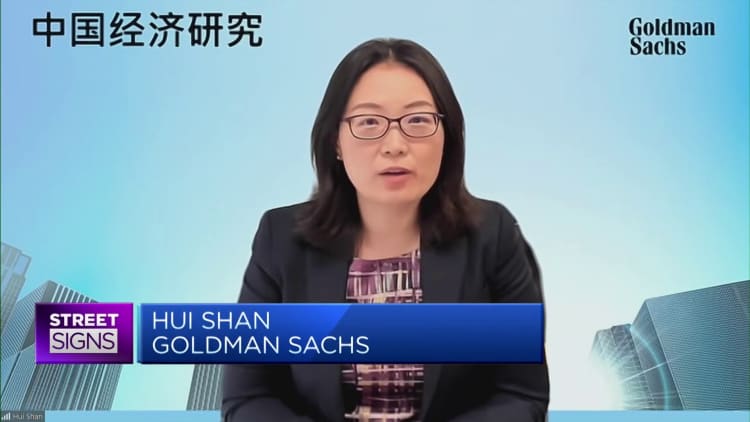[ad_1]
The People’s Bank of China (PBOC) building in Beijing on Dec. 15, 2022.
Bloomberg | Bloomberg | Getty Images
Chinese authorities plan to further “reshape” the country’s bond market but have learned lessons from the chaos that ensued when a data feed ban was abruptly imposed last month, two regulatory sources with knowledge of the matter said.
The turmoil highlighted how regulatory action in China can come with little warning and in a seemingly arbitrary manner. In this case, it also exposed a lack of coordination between various regulatory bodies including the China Banking and Insurance Regulatory Commission, or CBIRC, and the central bank, according to market sources.
“After the chaos, coordination between bodies will be strengthened,” one of the regulatory sources said.
On March 15, interdealer brokers were suddenly banned from providing real-time bond price data to Chinese financial information platforms. Turnover in the market — the world’s second-largest bond market with $21 trillion in notes outstanding — slid and traders said they had to scramble to chat groups for quotes.
Two days later, the ban was lifted, allowing interdealer brokers to provide real-time data again to information platforms except Qeubee, then the dominant terminal, according to market, industry and regulatory sources.
Chinese authorities have not commented publicly on the reasons for their actions.
At the time, interdealer brokers had been told by regulators that the provision of price data to terminals was outside their scope of business and that data security was a concern, according to sources.
But regulatory desire to break up an exclusive deal that Qeubee’s owner, Ningbo Sumscope Information Technology, had with Tullett Prebon SITICO (China) was also a key factor, the two regulatory sources said.
According to a third regulatory source with direct knowledge of the matter, concern about the exclusive deal was the “most essential reason” for the ban.
The sources were not authorized to speak to media and declined to be identified.
Sumscope said it has always operated within the law but declined further comment. TP ICAP, Tullet Prebon’s parent company, declined to comment while calls to Tullet Prebon’s Chinese joint venture were not answered.
Once dominant
Tullet Prebon likely accounts for 30% of the available quotes on Chinese bonds, according to an executive at a rival data vendor who also declined to be identified.
Sumscope had, however, frequently raised Qeubee prices in recent years, according to market sources. According to one fund manager who asked to be identified only by his surname Yang, qeubee costs his company more than two other terminals combined.
In contrast to the pre-ban market, Tullet Prebon’s data is now available on all other bond market information platforms including Wind, Dealing Matrix and government-affiliated iDeal.
China’s interbank bond market operator also said on March 20 that iDeal now offers price data from six interdealer brokers. That compares with just two before the ban.
The strength of the market’s reaction to the data ban had surprised authorities, according to one of the regulatory sources.
Officials at the CBIRC, which oversees the nation’s interdealer brokers, as well as officials from the People’s Bank of China and affiliated body China Foreign Exchange Trade System, or CFETS, attended a March 16 emergency meeting with interdealer brokers and market makers to address the bond market turmoil, sources said.

The CBRIC, the central bank and CFETS did not respond to Reuters requests for comment.
Nor did the State Administration for Market Regulation, which according to three of the sources had opened an antitrust probe into exclusive deals in the interdealer brokering industry late last year.
Reuters was not able to determine the status of the investigation.
Compared to overseas markets, in China’s bond market, market makers such as big banks — which match buyers and sellers as well as trade bonds themselves — are much less active.
A lack of liquidity in many types of Chinese bonds as well as a lack of diversity in the institutions that buy bonds mean market makers can be vulnerable to losses, analysts say.
Two of the sources said regulators were still intent on further reshaping the market, including specifying how data should be handled and clarifying the business scope and limits of interdealer brokers. They did not elaborate further.
Xu Ya, a bond analyst at SWS Research, said regulators were also likely intending to “strengthen supervision from a data security perspective over certain interdealer brokers and financial terminal vendors.”
She noted that data security has been a hot-button topic for Chinese regulators in recent years, especially where businesses are foreign-owned.
Five of China’s six interdealer brokers providing bond data are joint ventures with foreign companies such as NEX International, part of CME, and Compagnie Financiere Tradition. The other broker is wholly foreign-owned.
[ad_2]

